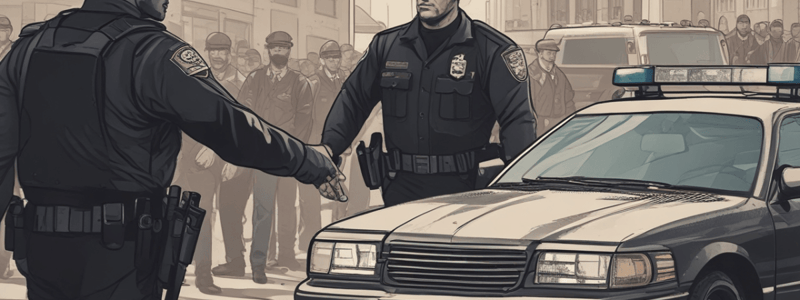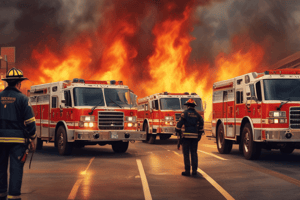Podcast
Questions and Answers
What is the primary purpose of the disciplinary process in the Escambia County Sheriff's Office?
What is the primary purpose of the disciplinary process in the Escambia County Sheriff's Office?
- To punish members for unacceptable behavior
- To establish new rules and regulations for the agency
- To advise members of inappropriate behavior and encourage acceptable performance (correct)
- To adhere to federal and state constitutional provisions
What is necessary for discipline to occur?
What is necessary for discipline to occur?
- When a member requests a disciplinary action
- When a supervisor deems it necessary
- When there is a breach of contractual agreements
- When conduct falls below an acceptable standard (correct)
What is the approach used by the Escambia County Sheriff's Office when it comes to discipline?
What is the approach used by the Escambia County Sheriff's Office when it comes to discipline?
- Uniform approach to discipline (correct)
- Case-by-case basis approach to discipline
- Progressive discipline approach
- Informal corrective actions approach
What is the review responsibility for this disciplinary process?
What is the review responsibility for this disciplinary process?
What is the distribution code for this disciplinary process?
What is the distribution code for this disciplinary process?
What is the purpose of progressive discipline?
What is the purpose of progressive discipline?
What is the criteria of discipline based on?
What is the criteria of discipline based on?
What type of actions are considered informal corrective actions?
What type of actions are considered informal corrective actions?
When should a supervisor recommend formal discipline?
When should a supervisor recommend formal discipline?
What is the purpose of remedial training?
What is the purpose of remedial training?
What is the definition of counseling according to the Escambia County Sheriff's Office?
What is the definition of counseling according to the Escambia County Sheriff's Office?
What is the result of a demotion?
What is the result of a demotion?
What is the purpose of a Disciplinary Review Board?
What is the purpose of a Disciplinary Review Board?
Who may appeal disciplinary action according to the Collective Bargaining Agreement?
Who may appeal disciplinary action according to the Collective Bargaining Agreement?
What is the definition of suspension?
What is the definition of suspension?
What is the result of a dismissal?
What is the result of a dismissal?
What is the goal of discipline in the Escambia County Sheriff's Office?
What is the goal of discipline in the Escambia County Sheriff's Office?
What must occur for discipline to be necessary?
What must occur for discipline to be necessary?
What document is related to the disciplinary process and outlines the rules and regulations of the agency?
What document is related to the disciplinary process and outlines the rules and regulations of the agency?
What is the purpose of a uniform approach to discipline?
What is the purpose of a uniform approach to discipline?
What is the reference number for the Counseling/Reprimand Form?
What is the reference number for the Counseling/Reprimand Form?
How often is this disciplinary process reviewed?
How often is this disciplinary process reviewed?
What is the effective date of this disciplinary process?
What is the effective date of this disciplinary process?
Which of the following is not a related document to the disciplinary process?
Which of the following is not a related document to the disciplinary process?
What is the purpose of a supervisor recommending formal disciplinary action?
What is the purpose of a supervisor recommending formal disciplinary action?
What type of members have no appeal rights unless specifically granted in their agreement?
What type of members have no appeal rights unless specifically granted in their agreement?
What is the purpose of counseling according to the Escambia County Sheriff's Office?
What is the purpose of counseling according to the Escambia County Sheriff's Office?
What is the result of a suspension?
What is the result of a suspension?
What is the purpose of a Disciplinary Review Board?
What is the purpose of a Disciplinary Review Board?
What is the purpose of remedial training?
What is the purpose of remedial training?
What is the result of a demotion?
What is the result of a demotion?
What is the role of a supervisor in the disciplinary process?
What is the role of a supervisor in the disciplinary process?
Study Notes
Disciplinary Process Overview
- The purpose of the disciplinary process is to advise members of inappropriate behavior and encourage them to perform in an acceptable manner.
- Discipline is necessary when conduct falls below an acceptable standard and breaches established rules and regulations.
Authority to Discipline
- The Escambia County Sheriff's Office has a uniform approach to discipline that complies with federal and state constitutional provisions, Florida Statutes, Sheriff's Office Rules and Regulations, and applicable contractual and negotiated agreements.
Progressive Discipline
- Progressive discipline is used to address unacceptable behavior and performance.
Criteria of Discipline
- Criteria for discipline include the severity of the violation, the member's prior disciplinary history, and the impact on the agency.
Informal Corrective Actions
- Informal corrective actions include counseling and remedial training to address performance issues.
- Counseling is used to bring attention to the need to improve performance, work habits, behavior, or attitude and serve as a warning against further repetition of unsatisfactory conduct.
Formal Disciplinary Actions
- Formal discipline should be recommended by a supervisor when there is reason to believe a member has violated an agency policy, general order, or rules and regulations.
- Formal disciplinary actions include demotion, dismissal, suspension, and remedial training.
Disciplinary Review Board
- The Disciplinary Review Board reviews and recommends formal disciplinary actions.
Final Decision in Disciplinary Processes
- The Sheriff makes the final decision in disciplinary processes.
Appeals Process
- Members with rights established in a collective bargaining agreement may appeal disciplinary action in accordance with the Collective Bargaining Agreement.
- Members covered by an individual employment agreement have no appeal rights unless specifically granted in the agreement.
Responsibilities
- Supervisors are responsible for documenting and reporting incidents, recommending disciplinary actions, and conducting counseling sessions.
- Members are responsible for adhering to agency policies, general orders, and rules and regulations.
Administrative Leave
- Administrative leave may be used in conjunction with disciplinary actions.
- Administrative leave is an enforced leave of absence with or without pay.
Disciplinary Process Overview
- The purpose of the disciplinary process is to advise members of inappropriate behavior and encourage them to perform in an acceptable manner.
- Discipline is necessary when conduct falls below an acceptable standard and breaches established rules and regulations.
Authority to Discipline
- The Escambia County Sheriff's Office has a uniform approach to discipline that complies with federal and state constitutional provisions, Florida Statutes, Sheriff's Office Rules and Regulations, and applicable contractual and negotiated agreements.
Progressive Discipline
- Progressive discipline is used to address unacceptable behavior and performance.
Criteria of Discipline
- Criteria for discipline include the severity of the violation, the member's prior disciplinary history, and the impact on the agency.
Informal Corrective Actions
- Informal corrective actions include counseling and remedial training to address performance issues.
- Counseling is used to bring attention to the need to improve performance, work habits, behavior, or attitude and serve as a warning against further repetition of unsatisfactory conduct.
Formal Disciplinary Actions
- Formal discipline should be recommended by a supervisor when there is reason to believe a member has violated an agency policy, general order, or rules and regulations.
- Formal disciplinary actions include demotion, dismissal, suspension, and remedial training.
Disciplinary Review Board
- The Disciplinary Review Board reviews and recommends formal disciplinary actions.
Final Decision in Disciplinary Processes
- The Sheriff makes the final decision in disciplinary processes.
Appeals Process
- Members with rights established in a collective bargaining agreement may appeal disciplinary action in accordance with the Collective Bargaining Agreement.
- Members covered by an individual employment agreement have no appeal rights unless specifically granted in the agreement.
Responsibilities
- Supervisors are responsible for documenting and reporting incidents, recommending disciplinary actions, and conducting counseling sessions.
- Members are responsible for adhering to agency policies, general orders, and rules and regulations.
Administrative Leave
- Administrative leave may be used in conjunction with disciplinary actions.
- Administrative leave is an enforced leave of absence with or without pay.
Studying That Suits You
Use AI to generate personalized quizzes and flashcards to suit your learning preferences.
Related Documents
Description
This quiz covers the disciplinary process in law enforcement, including its purpose and the authority to discipline. It outlines the standards and regulations that govern disciplinary actions.




